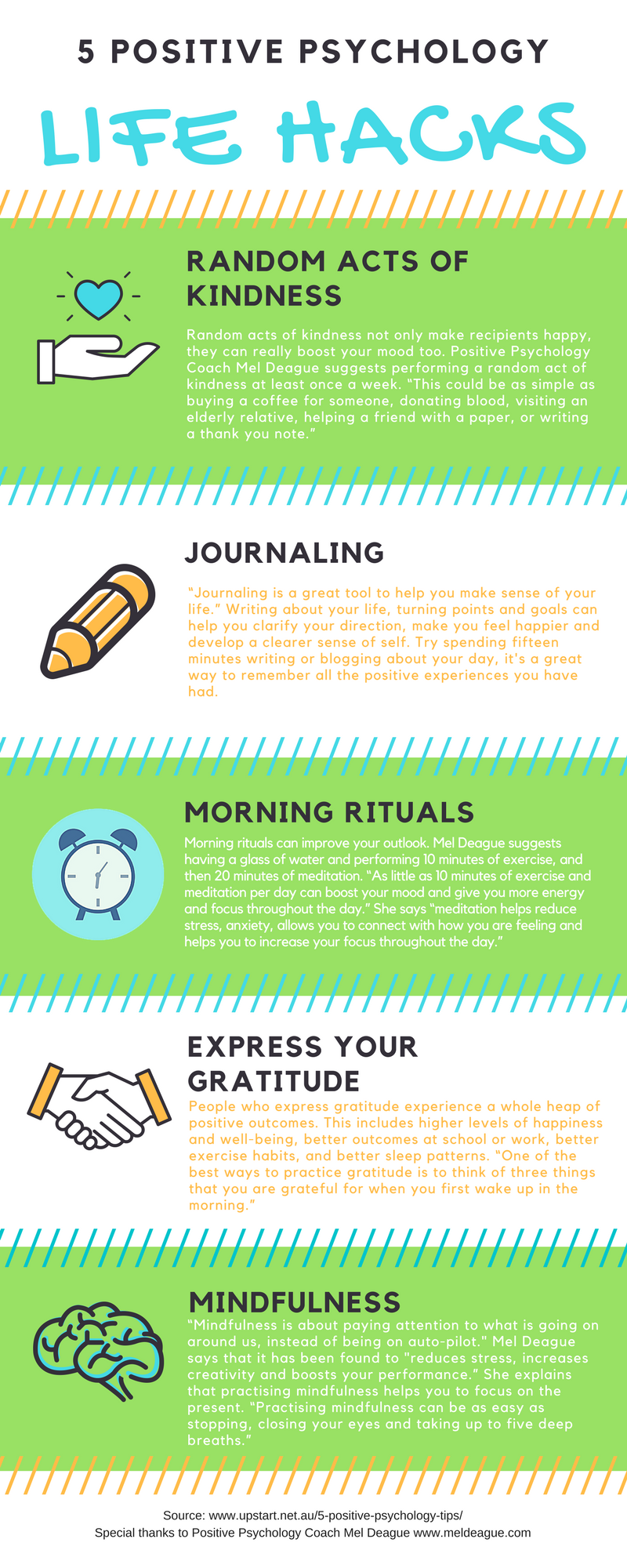Earlier this year, a survey by Headspace and the National Union of Students found that 65 percent of the students suffered high levels of psychological stress. More than half reported having difficulty sleeping and suffering panic attacks.
“There is a growing mental health crisis,” Dr Peggy Kern, senior lecturer at University of Melbourne in Positive Psychology told upstart. “But what if we prevent the disorder from occurring in the first place? Positive psychology develops skills, attitudes, and behaviours that can help prevent mental illness from occurring.”
In life, people often focus on weaknesses and problems. “Positive psychology focuses on what is good in people, and how we can make those strengths stronger,” said Kern.
“You’re going to be better able to face these pressures if you already have strategies to deal with the pressures”. She said good habits can keep you going and allow you to put your energy into learning.
5 positive psychology tools for a happy life

As due dates approach, assignments pile-up and classes pick-up the pace, students can begin to feel increasingly overwhelmed.
According to Kern, Positive Psychology helps students be proactive when caring for their mental health as well as giving them strategies that can help them to be resilient.
Mel Deague is a Positive Psychology Coach and author. She explained that when people experience positive emotions, it can lead to increased creativity, and enhanced resilience.
She said positive emotions that are nurtured can also lead to “better relationships, better physical health, as well as more success.”
“Although there are a lot of bad things that can happen in life, there is even more good, happiness and joy that is also happening and [positive psychology] is about bringing attention to the good things too.”
To refocus, de-stress, motivate yourself and increase that happiness quotient, there are several techniques you can try.
Deague gave upstart some insight into how you can use these positive psychology tools to brighten your day.
1. Random acts of kindness
“Performing acts of kindness is a great positivity booster and studies have shown that it increases life satisfaction and improves the mood of the giver and the receiver.”
Deague suggests choosing one day per week to perform a random act of kindness. “This could be as simple as buying a coffee for someone, donating blood, visiting an elderly relative, helping a friend with a paper, or writing a thank you note.”
2. Three gratitudes
There has been a lot of research into gratitude and its effect on happiness. According to Deague, people who express their gratitude or experience gratitude will often see a whole heap of positive outcomes.
This includes higher levels of happiness and well-being, better outcomes at school or work, better exercise habits, and better sleep patterns.
“One of the best ways to practice gratitude is to think of three things that you are grateful for when you first wake up in the morning.”
Alternatively, she said before dozing off at night, you can think about three things you were grateful for during your day.
3. Journaling
“Journaling is a great tool to help you make sense of your life.” She explained that it can clarify your direction, and “make you feel happier and develop a stronger and clearer sense of self.”
She said the beauty of journaling is that you can write about whatever you like. Deague suggests you try writing about your life. Touch on important events, turning points, and your goals.
4. Morning rituals
“The way you start the day is the way you live each day and that is why I recommend everyone to start a morning ritual.”
Before you check your phone, she suggests you have a glass of water and perform ten minutes of exercise, like stretching and then 20 minutes of meditation.
“As little as 10 minutes of exercise and meditation per day can boost your mood and give you more energy and focus throughout the day.”
Deague says “Meditation helps reduce stress, anxiety, and allows you to connect with how you are feeling and helps you to increase your focus throughout the day.”
5. Mindfulness
“Mindfulness is about paying attention to what is going on around us, instead of being on auto-pilot and it can help reduce stress, increases creativity and boosts your performance.”
Deague said that getting into a mindfulness habit can “increase your alertness and reduce your reactivity to stressful situations or people.”
She explained that practising mindfulness helps you to focus on the present. “Practising mindfulness can be as easy as stopping, closing your eyes and taking up to five deep breaths.”
Think you might know someone who could do with some positivity? Perform a random act of kindness and send them this infographic:

If you’re interested in learning more about Positive Psychology, a TED talk by happiness researcher and positive psychology advocate Shawn Achor, published in 2011, is one of the top 25 most popular TED talks ever, with close to 16 million views.

Rhiann McNally is a postgraduate student at La Trobe University. You can find her on Twitter at @rhiannmcnally







